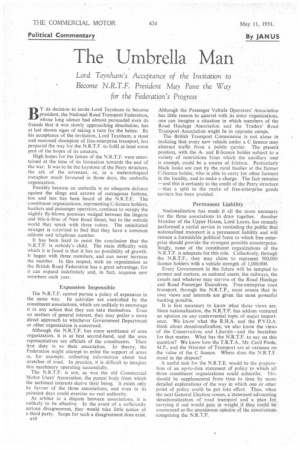Political Commentary The Umbrella Man
Page 44

If you've noticed an error in this article please click here to report it so we can fix it.
Lord Teynham 's Acceptance of the Invitation to Become N.R.T.F. President May Pave the Way for the Federation's Progress
By JAN US BY its decision to invite Lord Teynham to become president, .the National Road Transport Federation, whose long silence had almost persuaded even its friends that it was slowly approaching dissolution, has at last shown signs of taking a turn for the better. By his acceptance of the invitation, Lord Teynham, a stout and seasoned champion of free-enterprise transport, has prepared the way for the N.R.T.F. to fulfil at least some part of the hopes of its creators.
High hopes for the future of the N.R.T.F. were entertained at the time of its formation towards the end of the war. It was to be the keystone of the Perry structure, the ark of the covenant, or, in a meteorological metaphor much favoured in those days, the umbrella organization.
Possibly because an umbrella is no adequate defence against the slings and arrows of outrageous fortune, less and less has been heard of the N.R.T.F. The constituent organizations, representing C-licence holders, hauliers and passenger operators, continue to occupy the slightly fly-blown premises wedged between the lingerie and bric-i-brac of New Bond Street, but to the outside world they speak with three voices. The uninitiated stranger is surprised to find that they have a common address and telephone number.
It has been hard to resist the conclusion that the N.R.T.F. is nobody's child. The main difficulty with which it is faced is that it has no possibility of growth. It began with three members, and can never increase the number. In this respect, such an organization as the British Road Federation has a great advantage, for it can expand indefinitely and, in fact, acquires new members each year.
Expansion Impossible The N.R.T.F. cannot pursue a policy of expansion in the same way. Its activities are controlled by the constituent associations, which are unlikely to encourage it in any action that they can take themselves. Even on matters of general interest, they may prefer a more direct approach to whichever Government Department or other organization is concerned.
Although the N.R.T.F, has some semblance of area organization, it is at best second-hand, and the area representatives are officials of the constituents. Their First duty is to their association. In theory, the Federation might attempt to enlist the support of areas in, for example, collecting information about bad stretches of road. In practice, it is difficult to imagine this machinery operating successfully.
The N.R.T.F. is not, as was the old Commercial Motor Users' Association, the parent body from which the sectional interests derive their being. It exists only by favour of the three associations, and even in its palmiest days could exercise no real authority.
As arbiter in a dispute between associations, it is unlikely to be effective. In the event of a sufficiently serious disagreement, they would take little notice of a third party. Scope for such a disagreement does exist.
510 Although the Passenger Vehicle Operators' Association has little reason to quarrel with its sister organizations, one can imagine a situation in which members of the Road Haulage Association and the Traders' Road Transport Association might be in opposite camps.
The British Transport Commission is not alone in realizing that every new vehicle under a C licence may abstract traffic from a public carrier. The present position, with the Aand B-licence holder subject to a variety of restrictions from which the ancillary user is exempt, could be a source of friction. Particularly black looks are cast by the rural haulier at the farmer C-licence holder, who is able to carry for other farmers in the locality, and to make a charge. The fact remains —and this is certainly to the credit of the Perry structure —that a split in the ranks of free-enterprise goods carriers has been avoided.
Permanent Liability
Nationalization has made it all the more necessary for the three associations to draw together. Another Member of the Upper House, Lord Lucas, has recently performed a useful service in reminding the public that nationalized transport is a permanent liability and will remain a formidable political force to which free enterprise should provide the strongest possible counterpoise. Singly, none of the constituent organizations of the N.R.T.F. is adequate for this role. Collectively, through the N.R.T.F., they may claim to represent 500,000 licence holders with a vehicle strength of 1,000,000.
Every Government in the future will be tempted to protect and nurture, as national assets, the railways, the canals and whatever may survive of the Road Haulage and Road Passenger Executives. Free-enterprise road transport, through the N.R.T.F., must ensure that its own views and interests are given the most powerful backing possible.
It is first necessary to know what those views are. Since nationalization, the N.R.T.F. has seldom ventured an opinion on any controversial topic of major importance. We know what the R.H.A. and the P.V.O.A. think about denationalization; we also know the views of the Conservatives and Liberals—and the Socialists for that matter. What has the N.R.T.F. to say on this question? We know how the T.R.T.A., Mr. Cecil Poole, M.P., and the Minister of Transport are at variance on the value of the C licence. Where does the N.R.T.F. stand in the dispute?
A useful task for the N.R.T.E. would be the preparation of an up-to-date statement of policy to which all three constituent organizations could subscribe. This should be supplemented from time to time by more detailed explanations of the way in which one or other point of policy could be put into effect. Thus, when the next General Election comes, a statement advocating denationalization of road transport and a plan for carrying it out would gain in weight if they could be announced as the unanimous opinion of the associations comprising the N.R.T.F.




























































































